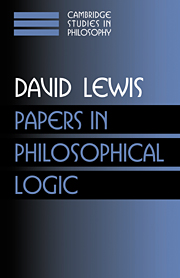Book contents
- Frontmatter
- Contents
- Dedication
- Introduction
- 1 Adverbs of quantification
- 2 Index, context, and content
- 3 ‘Whether’ report
- 4 Probabilities of conditionals and conditional probabilities II
- 5 Intensional logics without iterative axioms
- 6 Ordering semantics and premise semantics for counterfactuals
- 7 Logic for equivocators
- 8 Relevant implication
- 9 Statements partly about observation
- 10 Ayer's first empiricist criterion of meaning: why does it fail?
- 11 Analog and digital
- 12 Lucas against mechanism
- 13 Lucas against mechanism II
- 14 Policing the Aufbau
- 15 Finitude and infinitude in the atomic calculus of individuals (with Wilfrid Hodges)
- 16 Nominalistic set theory
- 17 Mathematics is megethology
- Index
10 - Ayer's first empiricist criterion of meaning: why does it fail?
Published online by Cambridge University Press: 05 June 2012
- Frontmatter
- Contents
- Dedication
- Introduction
- 1 Adverbs of quantification
- 2 Index, context, and content
- 3 ‘Whether’ report
- 4 Probabilities of conditionals and conditional probabilities II
- 5 Intensional logics without iterative axioms
- 6 Ordering semantics and premise semantics for counterfactuals
- 7 Logic for equivocators
- 8 Relevant implication
- 9 Statements partly about observation
- 10 Ayer's first empiricist criterion of meaning: why does it fail?
- 11 Analog and digital
- 12 Lucas against mechanism
- 13 Lucas against mechanism II
- 14 Policing the Aufbau
- 15 Finitude and infinitude in the atomic calculus of individuals (with Wilfrid Hodges)
- 16 Nominalistic set theory
- 17 Mathematics is megethology
- Index
Summary
In the first edition of Language, Truth and Logic, Ayer proposes that ‘the mark of a genuine factual proposition’ is ‘that some experiential propositions can be deduced from it in conjunction with certain other premises without being deducible from those other premises alone’([1], pp. 38–9).
Berlin objects that the criterion is ‘a good deal too liberal’ and admits patent nonsense. His example, near enough, is that the experiential proposition ‘I dislike this logical problem’ can be deduced from the nonsensical ‘this logical problem is green’ in conjunction with the premise ‘I dislike whatever is green’ without being deducible from the latter premise alone ([2], p. 234). Berlin's point is well taken, if indeed a category mistake is nonsense. But it shows at most that the criterion admits too much. We do not yet know how much too much.
In his introduction to the second edition, Ayer accepts Berlin's point in a greatly extended form. Not only does the criterion admit this or that piece of nonsense; it ‘allows meaning to any statement whatsoever. For, given any statement “S” and an observation-statement “O”, “O” follows from “S” and “if S then O” without following from “if S then O” alone’ ([1], p. 11).
Here Ayer goes wrong. For it may very well happen that the consequent of a conditional ‘if S then O’ does follow from that conditional alone. For instance, O follows from ‘if (P or not P) then O’ and from ‘if not O, then O’. Ayer has just overlooked such cases. In general, O follows from ‘if S then O’ just when ‘S or O’ is analytic.
- Type
- Chapter
- Information
- Papers in Philosophical Logic , pp. 156 - 158Publisher: Cambridge University PressPrint publication year: 1997



